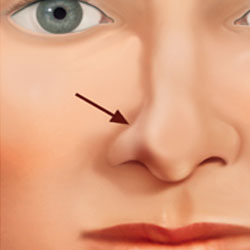This is a common cause of nasal obstruction. It occurs when cartilage in the nasal tip collapses when inhaling. The most common causes of nasal breathing problems are deviated (crooked) septums and enlarged turbinates (turbinate hypertrophy). Nasal valve collapse may play a prominent role in 1 out of 4 patients with nasal obstruction.
The nasal valve includes several structures. The most important is where the upper lateral cartilages meet the septum. This is an extremely narrow area, and even a very small decrease in diameter can cause major obstruction. Narrowing is often the result of nasal trauma (such as a nasal fracture) or a prior nasal surgery — such as a cosmetic rhinoplasty. However, some patients may have nasal valve collapse with no history of previous trauma or surgery. In those cases, the collapse may be due to weak nasal sidewall cartilages.
The diagnosis of a nasal valve collapse can be made either in the medical office or at home. If breathing is improved by manually opening the nasal valve – pushing the cheek skin towards the ear or lifting the upper lateral cartilage up from inside the nose — then nasal valve collapse is most likely the cause of breathing difficulties. Patients who have to use Breathe Right strips to improve nasal breathing may have nasal valve collapse.
There are both surgical and non-surgical treatments for nasal valve collapse.
Nonsurgical treatment includes use of allergy medicines (antihistamines and steroid nasal sprays) as well as Breathe Right strips.
Surgical treatment involves reconstructing the upper lateral and lower lateral cartilages. This discourages collapse and improves the nasal airway. Nasal valve surgery is performed through a small, external incision at the base of the nose. The patient’s nasal and sometimes ear cartilage are used for reconstruction.
At Raleigh Capitol ENT, we’re pleased to offer the following treatments for nasal valve collapse:
• LATERA
• VivAer radiofrequency treatment
• Nasal surgery
Learn more about these innovative treatments.
Do you think you may have nasal valve collapse? Contact us to schedule an appointment.

